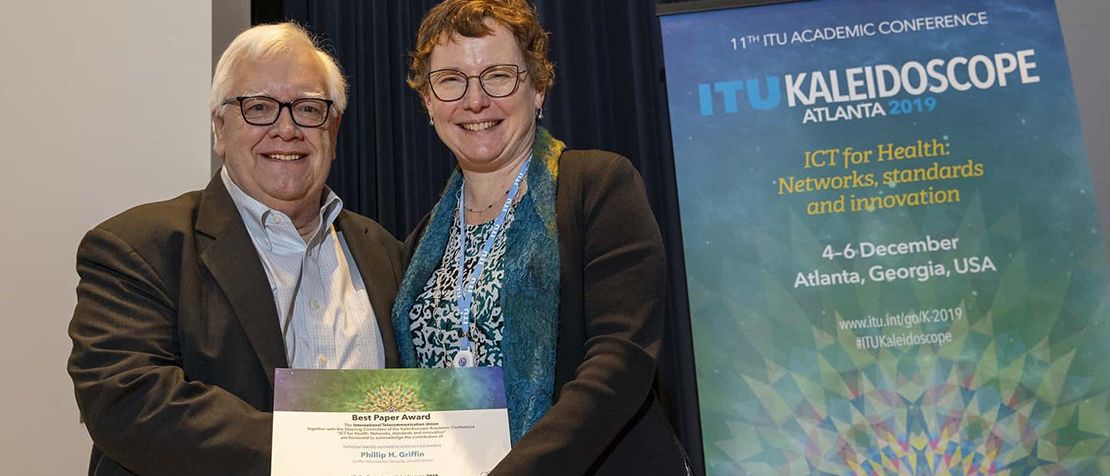
Authentication solution for people with disabilities wins 1st prize at Kaleidoscope 2019
Phillip H. Griffin from the U.S. has claimed 1st prize at Kaleidoscope 2019 for a proposal to extend the password-based ‘shared secret’ model of authentication with other authentication factors, such as biometrics. The proposal aims to support universal access to digital health services, recognizing that disabilities can sometimes form a barrier to the use of passwords.
All papers presented at the conference can be found in the Kaleidoscope 2019 Proceedings.
ITU Kaleidoscope events are peer-reviewed academic conferences that increase dialogue between academics and ICT standardization experts. The aim of the conference is to identify emerging trends in ICT research and associated implications for international standardization.
ITU Kaleidoscope 2019: ICT for Health, the 11th edition of the Kaleidoscope conference, called for papers highlighting how digital health could serve everyone, everywhere.
The conference explored ICTs’ contribution to healthcare delivery and medicine, as well as the demands that such innovation will place on ICT networks and supporting technical standards.
Kaleidoscope’s three winning papers offer proposals relevant to the standardization work of ITU-T Study Group 17 (Security) and ITU-T Study Group 16 (Multimedia), as well as the exploratory ‘pre-standardization’ studies led by the Focus Group on ‘Artificial Intelligence for Health’ supported in close cooperation by ITU and the World Health Organization (WHO).
1st prize: ‘Thought-based authenticated key exchange’
Author: Phillip H. Griffin (Griffin Information Security, U.S.)
WHO highlights that more than a billion people worldwide live with some form of disability. Kaleidoscope’s winning paper proposes to extend the password-authenticated key exchange protocols – the weak ‘shared secret’ model of authentication, often dependent on usernames and passwords – with other authentication factors, such as biometrics. The proposal aims to enable secure access to digital health services, especially for people with disabilities relying on assistive devices.
2nd prize: ‘Redesigning a basic laboratory information system for the Global South’
Authors: Jun Wook Park, Aditi Shah, Rosa Arriaga, Santosh Vempala (Georgia Tech, U.S.)
The paper presents a case study of an open-source ‘laboratory information system’ redesigned with improved usability in mind. The system – developed by Georgia Tech and health authorities in the U.S. and Africa – has been deployed in over 100 hospitals in seven African countries since 2010. It aims to ensure highly efficient access to digital health records over devices such as smartphones or tablets. Users of the latest version of the system in three African countries participated in the paper’s case study.
3rd prize: ‘Elderly health monitoring system with fall detection using multi-feature based person tracking’
Authors: Dhananjay Kumar, Aswin Kumar Ravikumar and Vivekanandan Dharmalingham (Anna University, India); and Ved P. Kafle (National Institute of Information and Communications Technology, Japan).
The paper proposes the introduction of a ‘multi-feature-based person tracker’ supported by a vision-based deep learning solution to detect falls among the elderly. The proposed vision-based system is an alternative to the sensor-oriented systems offered by wearable ICT devices. The paper presents research that has shown the proposed system to be capable of a 94.67 per cent precision in tracking and 98.01 per cent accuracy in fall detection.
Thanks to the Kaleidoscope community
Kaleidoscope 2019 was held in Atlanta, U.S., 4-6 December 2019, hosted by ITU Academia member Georgia Tech. The conference was organized by ITU in partnership with WHO. The technical co-sponsors of the conference were the Institute of Electrical and Electronics Engineers (IEEE), IEEE Communications Society and The Lancet Digital Health.
The 20 papers selected for presentation at the conference were selected by a 75-member Technical Programme Committee, a double-blind peer-review process, under the leadership of a Steering Committee.
All papers selected for presentation at the conference have been published in the Kaleidoscope 2019 Proceedings and will be submitted for publication in the IEEE Xplore Digital Library. Outstanding papers may also be published in the IEEE Communications Standards Magazine.
A selection of extended Kaleidoscope papers may be published in the International Journal of Technology Marketing, the International Journal of Standardization Research and the Journal of ICT Standardization.
Contribute to Kaleidoscope 2020 in Viet Nam
Kaleidoscope 2020: Industry-driven digital transformation will analyse industry’s introduction of new technologies capitalizing on connectivity and intelligence.
Submissions are invited until 6 April 2020.
< Download the Call for Papers >
Kaleidoscope 2020 is expected to explore innovations in fields such as robotics, cyber-physical systems, digital twins, virtual simulation, augmented reality, edge computing, artificial intelligence and blockchain – innovations all contributing to the digital transformation of industrial processes.
The conference will be held in Ha Noi, Viet Nam, 7-9 September 2020, in conjunction with ITU Digital World, 6-9 September.
